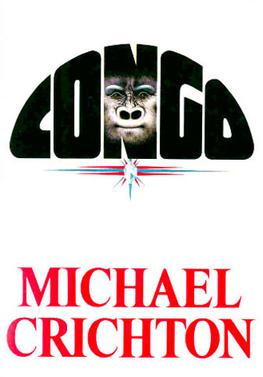Congo: A Great Take on the Lost City Trope
More stories from Lincoln Wheeler

Congo by Michael Crichton is a 1980 science fiction novel that is just about as good as the lost city trope can get. And it’s pretty dang good. At first glance, the story seems simple enough: a company that researches earthly resources receives an enigmatic request from a confidential client, one that establishes and sends the Congo Field Survey to Zaire (now the Democratic Republic of the Congo) to find a specific type of diamond.
Things take a turn, however, when Karen Ross, a member of the team, happens across an old legend of a glorious flashy city, beneath which lies deposits of diamonds that the city folk mined and used graciously. After confirming a possible location for this city, dubbed the Lost City of Zinj, the Congo Field Survey is finally sent out to locate the alleged city and its shiny secret. But upon setting up camp one night, the entire team is brutally murdered: their heads smashed in by some unruly creature of Zaire. The only witness is a lone camera, broadcasting a video and audio feed across the world to the home base of the expedition, capturing a grainy, gorilla-like shape. You will be hard-pressed to find such an intriguing introduction to a story like in Congo. Suspense is consistently present throughout, and the mystery of what could have wreaked so much havoc keeps you guessing.
Still eager to fulfill the contract, they quickly send out a second expedition, consisting of Ross, Peter Elliot, a primatologist teaching and studying a sign-language speaking gorilla named Amy, who tags along herself and Charles Munro, a mercenary-turned-Congo-guide.
Along the way they face many problems: a competing consortium also contracted to locate the diamonds, the trigger-happy Zaire military and the cannibalistic Kigani tribe amidst a gory battle and perhaps most formidable, the fierce creatures responsible for the deaths of the first expedition. There is so much going on in its story but Congo is so well-paced that it really becomes a plus. Plot twists are abundant and it’s easy to forget one aspect of the conflict only for it to suddenly flare up when it’s least expected.
Crichton found a magnificent way to make a science fiction novel accessible. It’s well-researched, detailed and scientific, all while maintaining its readability. However, Crichton’s informational style, while almost perfected, is not without its downsides.
His characters, in particular, greatly suffer. Ross is perhaps the best written human; she is first a soulless woman, set on achieving her goal from the start, and thus easy to hate. When one of their porters is horribly killed, she responds very insensitively bringing her reputation down among her peers. However, her unprofessional side begins to show and she becomes more relatable as the book rolls on, specifically when things take a turn for the worse and the expedition must face a deadly situation. Aside from that, Elliot and Munro suffer from being your average character with no spice at all. Of course, the star of the show is undoubtedly Amy, the gorilla. Never could I have imagined that a sign-language speaking gorilla could seem so realistic and yet adorable. So while Elliot was boring on his own, his role in the relationship between him and Amy as an interpreter made him stronger. Overall, the characters in Congo are far better than those in Crichton’s 1969 book The Andromeda Strain.
As far as the plot goes, it throws curveballs left and right. There is never a dull moment in Congo, and all of the twists and turns stay grounded in realism, something Crichton is clearly talented in. Near the end of the story, things do air on the side of absurdity, but that’s what science fiction is for–to entertain the absurd.
While most things about this book I thoroughly loved, I do have some criticism. Crichton is not known for being the most politically-correct author. Of course whether this is a fault or not is usually subjective, but I feel in this case, it’s a negative. Crichton’s depiction of the Kigani tribe is hard to read. He demonizes them at various points and mentions strange and unnecessary details that are both out-of-place and offensive, like their hygiene. Strangely, though, Crichton seems to flip-flop on many occasions, at one point even delving deep into the history of cannibalistic tribes and why they are not evil or twisted, just a part of a different culture and oftentimes as friendly as anyone else.
One thing he definitely did right was use the story’s focus on gorillas to make a point about deforestation and the resulting extinction of rainforest animals. At first it’s subtle, characters mulling things over in their spare time, but it slowly escalates befores he sums it up loud and clear at the end.
Overall, there are very few things holding this novel back, and while I wouldn’t call it a masterpiece, I feel like one would be hard pressed to find a better lost city story than this. Crichton brings something for just about everyone with Congo, but for fans of suspense or science fiction specifically, this book would be perfect. There is never a dull moment and there are always interesting bits of clever and thought-provoking technology and biology to be mulled over.
Lincoln Wheeler (he/him) is a senior who loves playing hockey and guitar. He enjoys being a journalist because he wants to bring new perspectives and ideas to people.

